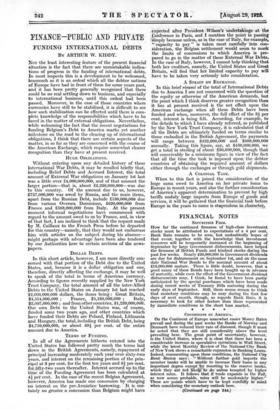FINAliCE-PITBLIC AND PRIVATE NOT the least interesting feature of the
present financial situation is the fact that there are unmistakable indica- tions of progress in the funding of international debts. In most respects this is a development to be welcomed, inasmuch as it is an ordeal which all the debtor nations of Europe have had in front of them for some years past, and it has been pretty generally recognized that there could be no real settling down to business, and especially to international business, until this ordeal had been passed. Moreover, in the case of those countries where currencies have still to be stabilized, it is difficult to see bow such stabilization can be effected until there is com- plete knowledge of the responsibilities which have to be faced in the matter of external obligations. Nevertheless, while welcoming the fact that the recent negotiations for funding Belgium's Debt to America marks yet another milestone on the road to the clearing up of international obligations, I think that there are certain aspects of the matter, in so far as they are concerned with the course of the American Exchange, which require somewhat clearer recognition than they have at present received.
HUGE OBLIGATIONS.
Without entering upon any detailed history of these international War Debts, it may be recalled briefly that, including Relief Debts and Accrued Interest, the total amount of External War obligations on January 1st last was a little over £4,000,000,000, and of that amount the larger portion—that is, about £2,236,000,000—was due to this country. Of the amount due to us, however, £757,000,000 was owed by Russia, and the main items, apart from. the Russian Debt, include £130,000,000 due from various Oversea Dominions, £620,000,000 from France and £583,000,000 from Italy. At the present moment informal negotiations have commenced with regard to the amount owed to us by France, and, in view of that fact, I am inclined to think that the request made by M. Caillaux to the French Press before he departed for this country—namely, that they would not embarrass him with articles on the subject during his, absence— might perhaps with advantage have been also tendered by our Authorities here to certain sections of the news- papers.
DOLLAR DEBTS. • • In this short article, however, I am more directly con- cerned -with that portion of the Debt due to the United States, and, because it is a dollar obligation and one, therefore, directly affecfmg the exchange, it may be well to speak of the total in terms of American currency. According to figures recently supplied by the New York Trust Company, the total amount of all the inter-Allied Debts to the United States on January 1st last reached -12,000,000,000 dollars, the items being : Great Britain, $4,554,000,000 ; France, $4,138,000,000 ; Italy, $2,097,000,000 ; and from other countries, $1,230;000,000. Our own Debt to the United States was, of course, funded some two years ago, and other countries which have funded their Debts are Poland, Finland, Lithuania and Hungary, the total, including the British Debt, being $4,750,000,000, or about 891 per cent. of the entire amount due to America.
TERMS OF FUNDING.
In all of the Agreements hitherto entered into the United States has followed pretty much the terms laid down in the British Agreements, namely, repayment of principal increasing moderately each year over sixty-two years, and interest on the remaining portion of the prin- ,cipal at 3 per cent.-for the first ten years and 31-per cent. fot,trfity-two years thereafter. Interest accrued up to the time of the Funding Agreement has been calculated at 41 per cent. In the case of the recent Belgian Agreement, however, America has made one concession by charging no interest on the' pre-Armistice borrowing. ' It is ctrr tainly no greater a concession: than Belgium might have expected after President Wilson's undertakings at the Conference in Paris, and I mention the point in passing simply because unless, as in the case of Italy, for example, " capacity to pay " is taken most carefully into con- sideration, the Belgian settlement would seem to mark the limits of concessions to which America is pre- pared to go in the matter of these External War Debts. In the case of Italy, however, I cannot help thinking that both her creditors, namely, the United States and Great Britain, will find that her limited capacity to pay will have to be taken very seriously into consideration.
A STRAIN ON EXCHANGE.
In this brief resumi of the total of International Debts due to America I -am not concerned with the question of the equity or otherwise of the American demands, but the point which I think deserves greater recognition than it has at present received is the net effect upon the American exchange when all these Debts have been funded and when, moreover, the full effect of the 31 per cent. interest is being felt. According, for example, to the details to which I have already referred, as published by the New York Trust Company, it is calculated that if all the Debts are ultimately funded on terms similar to those embodied in the British Agreement, the payments will range between $422,000,000 and '$486,000,1)00 annually. Taking this figum, say, at $450,000,000, we get a total in sterling of about £90,000,000, though that will conceivably be a minimum figure in view of the fact that all the time the taak irnposed upon the debtor countries of obtaining the required amount of dollars either through the exchanges or through gold shipments.
A CoLosses. TASK.
When to this fact is joined the consideration of the huge sums owed to Amefica on her private loans to Europe in recent years; and also the further consideration of America's apparent determination to prevent by high tariffs unduly large imports from Europe of goods and services, it will be gathered that the financial task before Europe in the. years to come is stupendous in .character.


































 Previous page
Previous page